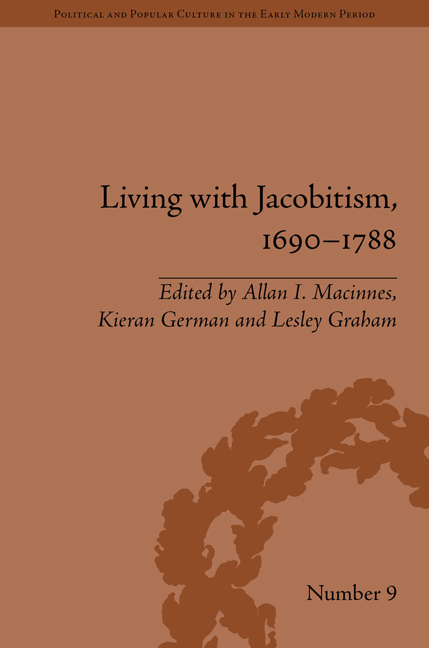Book contents
- Frontmatter
- CONTENTS
- List of Contributors
- List of Figures
- Abbreviations
- Preface: Breandán Ó Buachalla, A Tribute
- Introduction: Living with Jacobitism
- 1 The First Jacobite and the Scottish Parliament
- 2 The Scottish Jacobite Community at Saint-Germain after the Departure of the Stuart Court
- 3 Liturgy: The Sacramental Soul of Jacobitism
- 4 ‘Zealous in the Defence of the Protestant Religion and Liberty’: The Making of Whig Scotland, c. 1688–c. 1746
- 5 Jonathan Swift's Memoirs of a Jacobite
- 6 ‘Female Rebels’: The Female Figure in Anti-Jacobite Propaganda
- 7 Commerce and the Jacobite Court: Scottish Migrants in France,1688–1718
- 8 Ultramontane Ultras: The Intellectual Character of Irish Students at the University of Paris
- 9 To a Fair Meeting on the Green: The Order of Toboso and Jacobite Fraternalism, 1726–c. 1739
- 10 English and Scottish Jacobite Painters in Eighteenth-Century Rome
- 11 Polite War: Material Culture of the Jacobite Era, 1688–1760
- 12 Robert Adam: ‘My Mother's Dear British Boy’
- 13 From Jacobite to Jacobin: Robert Watson's Life in Opposition
- 14 Robert Louis Stevenson's ‘The Young Chevalier’: Unimagined Space
- Notes
- Index
7 - Commerce and the Jacobite Court: Scottish Migrants in France,1688–1718
- Frontmatter
- CONTENTS
- List of Contributors
- List of Figures
- Abbreviations
- Preface: Breandán Ó Buachalla, A Tribute
- Introduction: Living with Jacobitism
- 1 The First Jacobite and the Scottish Parliament
- 2 The Scottish Jacobite Community at Saint-Germain after the Departure of the Stuart Court
- 3 Liturgy: The Sacramental Soul of Jacobitism
- 4 ‘Zealous in the Defence of the Protestant Religion and Liberty’: The Making of Whig Scotland, c. 1688–c. 1746
- 5 Jonathan Swift's Memoirs of a Jacobite
- 6 ‘Female Rebels’: The Female Figure in Anti-Jacobite Propaganda
- 7 Commerce and the Jacobite Court: Scottish Migrants in France,1688–1718
- 8 Ultramontane Ultras: The Intellectual Character of Irish Students at the University of Paris
- 9 To a Fair Meeting on the Green: The Order of Toboso and Jacobite Fraternalism, 1726–c. 1739
- 10 English and Scottish Jacobite Painters in Eighteenth-Century Rome
- 11 Polite War: Material Culture of the Jacobite Era, 1688–1760
- 12 Robert Adam: ‘My Mother's Dear British Boy’
- 13 From Jacobite to Jacobin: Robert Watson's Life in Opposition
- 14 Robert Louis Stevenson's ‘The Young Chevalier’: Unimagined Space
- Notes
- Index
Summary
In recent years, a great deal of scholarship developing two strands of early modern Scottish history has emerged. One has focused on Scottish migration and settlement abroad, including the formation of Scottish ‘diasporas’ the other, inextricably linked, concerns the concept of a Scottish national identity – never more pertinent than in the current climate of debates on Scottish independence. Research examining the presence of Scots overseas has considered their role in foreign communities, the importance of the links they maintained with their homeland and, significantly, the ways in which Scots viewed, and were viewed by, a wider European world. To date, much of the focus on Scottish activity abroad in the early modern period has focused on Protestant, northern European destinations, though some scholarship has begun to emerge focusing on the Catholic sphere.
Debate regarding motivations for migration remains vociferous, yet waves of migration that correspond to shifts in the domestic or international political dynamic are particularly easy to discern. In Scotland's case, this includes migration ‘exoduses’ following the exile of the Catholic James II and VII to France, the Protestant William II and III's accession to the British thrones in 1689 and the attempted Franco-Jacobite invasions of Scotland in 1708 and 1715. Given Louis XIV's pro-Jacobite agenda and the housing of the exiled Stuart court at StGermain-en-Laye, France was an obvious destination for many who fled or who were pushed into exile; Eveline Cruickshanks asserts that France was the ‘most likely avenue of support for the Jacobites’.
- Type
- Chapter
- Information
- Living with Jacobitism, 1690–1788The Three Kingdoms and Beyond, pp. 99 - 110Publisher: Pickering & ChattoFirst published in: 2014

